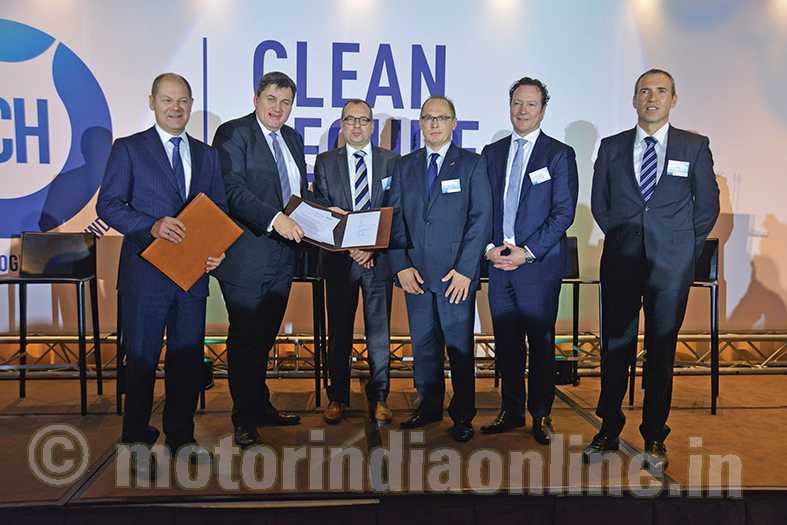Five major manufacturers sign Letter of Understanding
From left, Mr. Olaf Scholz, Mayor of Hamburg, Mr. Kit Malthouse, Deputy Mayor of London, Mr. Filip Van Hool, CEO, Van Hool, Mr. Dariusz Michalak, Deputy CEO, Solaris Bus & Coach, Mr. Rémi Henkemans, CEO, VDL Bus & Coach, and Mr. Gustav Tuschen, Head of Product Engineering, Daimler Buses, at the agreement signing ceremony
On November 12, representatives of five major European bus manufacturers – (Daimler Buses (EvoBus), MAN, Solaris, Van Hool and VDL Bus & Coach) – signed a joint Letter of Understanding at the Fuel Cells and Hydrogen Joint Undertaking’s (FCH JU) Stakeholders Forum in Brussels. The letter underlines the commitment of bus manufacturers towards commercialisation and market introduction of fuel cell electric buses in urban public transport. Fuel cell buses run on hydrogen and constitute a zero emissions transport alternative.
“The fuel cells and hydrogen technology is one of our important strategic development fields in the passenger car and urban bus business units”, said Gustav Tuschen, Head of Product Engineering at Daimler Buses.
At a symbolic ceremony, the letter was handed over to Olaf Scholz, First Mayor of the City of Hamburg, and Kit Malthouse, Deputy Mayor of London for Business and Enterprise, representing two major European cities at the forefront of promoting low-emissions public transport systems.
Olaf Scholz stated stated: “The City of Hamburg envisages purchasing only emission-free buses from 2020, thereby increasing the quality of life for all our citizens.”
Kit Malthouse said: “I firmly believe that the hydrogen fuel cell technology will eventually replace the internal combustion engine, and having a firm commitment from the bus industry to support an increase in hydrogen-powered vehicles on our streets is key. We want London to be at the forefront of the low-emission revolution, and getting these buses on the road is the first step towards a viable hydrogen future across the UK and the whole of Europe.”
This joint demonstration of commitment for alternative powertrains is expected to give greening of public transport a push. “In principle, fuel cell buses can be operated like conventional diesel buses without losses in productivity and flexibility”, says Filip van Hool, CEO of Belgian bus manufacturer van Hool.
The signing bus manufacturers are convinced that fuel cell buses offer the same degree of operational flexibility as conventional diesel buses due to comparatively long ranges and a low refuelling time, while they offer all advantages of electric vehicles: zero tailpipe emissions, significantly reduced noise and vibration levels and, therefore, higher passenger comfort.
Rémi Henkemans, Managing Director, VDL Bus & Coach, observed: “We believe in the electrification of urban bus systems in which the fuel cell range extender and hydrogen drive lines are interesting options. Modularity and reducing Total Cost of Ownership for zero-emission public transport will be our main strategy in the coming years.”
In the last decade, several large-scale projects demonstrated that fuel cell buses can be operated safely on European roads. There are currently about 50 fuel cell buses in service, with a further 20 to be added next year in over a dozen European cities.
A commercialisation initiative for fuel cell buses, launched by FCH JU and supported by the signing manufacturers and bus operators from major European cities such as Hamburg and London, aims at deploying a total volume of 500-1,000 fuel cell buses in Europe until 2020.
More than 30 European cities and regions as well as their transport agencies have already declared their interest in fuel cell buses within the bus commercialisation study of FCH JU.
